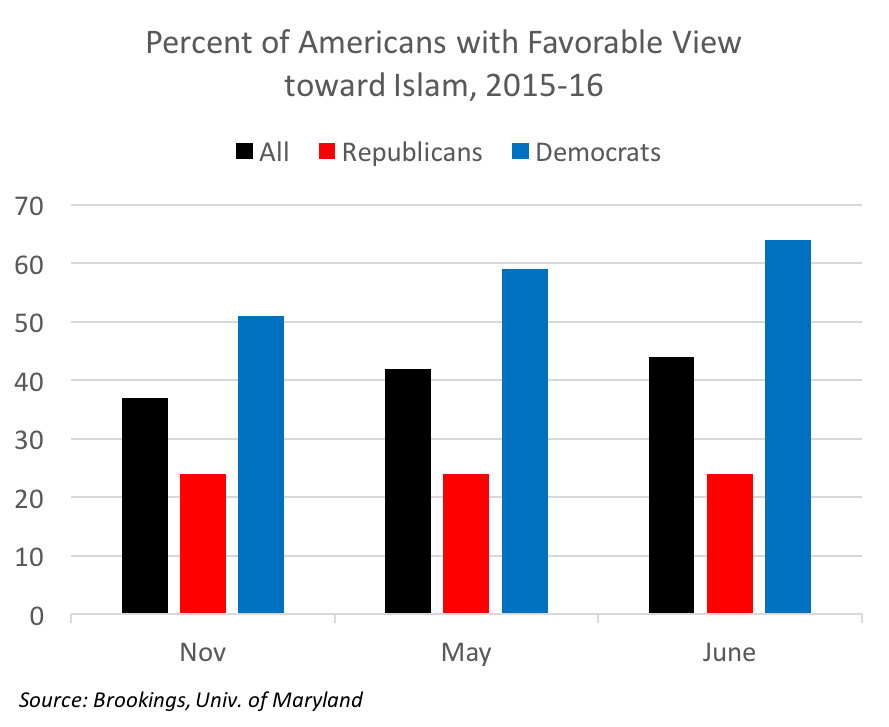Americans may be growing increasingly tolerant toward a minority group simply because they don’t wish to be associated with its loudest detractor.
By Seth Masket
Khizr Khan delivers remarks on the fourth day of the Democratic National Convention at the Wells Fargo Center on July 28th, 2016, in Philadelphia, Pennsylvania. (Photo: Aaron P. Bernstein/Getty Images)
Less than a week after the September 11th attacks, President George W. Bush said the following at the Islamic Center of Washington:
The face of terror is not the true faith of Islam. That’s not what Islam is all about. Islam is peace. These terrorists don’t represent peace. They represent evil and war.
Bush was helping to set a pattern for national political leaders in the post-Cold War era. Even while politicians of both parties would demagogue about the dangers of Muslim immigrants and even Muslim-American citizens, most national party would not. This was done for a number of political, moral, and strategic reasons, but the pattern has largely held. Presidential and vice presidential nominees have largely steered clear of singling out Muslims.
Until this year.
Fear of and anger toward Muslims has been one of the staples of Donald Trump’s presidential campaign, highlighted by his calls for a ban on Muslim immigrants and his attacks on the Khan family after their criticisms of him at the Democratic National Convention. This is only one of the hundreds of ways Trump’s campaign has been an historical aberration, but it is one that will likely have long-lasting impact.
Of course, there’s good reason for him to be taking these stances — a large percentage of the Republican electorate feels similarly, and these views helped propel him to his party’s nomination. But it has never been the obligation of a party nominee to advocate the loudest and most passionate views of its voters. Indeed, party leaders and nominees have often deviated from the preferences of their own party’s voters on many key issues, even if voters’ preferences may still impose some constraints on them. Party leaders have often engineered this by influencing which candidates get nominated and which don’t. This is a task in which Republican leaders notably failed this year, resulting in the nomination of someone with policy views that deviate massively from those of previous party nominees.
But the point is not only that Trump articulates some of the preferences of his base; he molds them. We can see few better examples of this than in attitudes toward Vladimir Putin. As a YouGov/Economist poll found, Democrats’ favorability toward Putin has remained unchanged for the past two years, while Republicans’ favorability has recently moved 40 points in Putin’s favor. Why? Because their presidential nominee, by praising Putin’s leadership style, has signaled that it’s OK to like Russia now.
What about attitudes toward Muslims? There, the story is a bit more complicated. A Brookings researcher conducted three large-scale surveys about attitudes toward Islam in November of 2015 and May and June of 2016. As the survey demonstrated, Republicans’ favorability rating toward Islam has remained steady at 24 percent. Interestingly, though, Democrats’ favorability toward Islam has steadily increased, from 51 to 64 percent. This has actually had the effect of improving Americans’ average favorability toward Muslims in a timespan that included the San Bernardino and Orlando shootings.

Why might this be? It’s possible that Democrats are responding to pro-Muslim comments made by Hillary Clinton and other Democratic leaders and the highlighting of speakers like the Khans at the Democratic convention. But I’d suggest that a much stronger signal was sent by Trump — he has spoken much more loudly against Muslims than any major Democrat has spoken in support of them. It’s quite possible Democrats are moving to embrace Muslims precisely because Trump has broadcast such a clear signal against them. They are seeing what the other party’s leader is doing and embracing its opposite.
This may prove to be a silver lining to an otherwise pretty ugly Republican presidential candidacy. Trump himself could be making Islamophobia unpopular. Americans may be becoming increasingly tolerant toward a minority group simply because they don’t wish to be associated with its loudest detractor.




